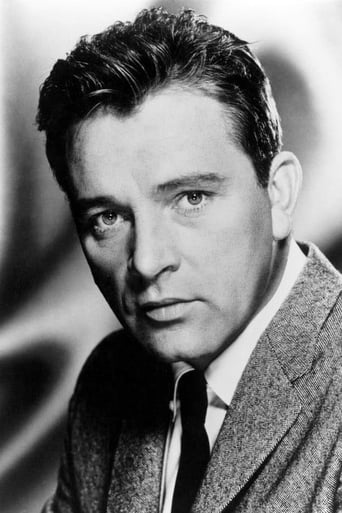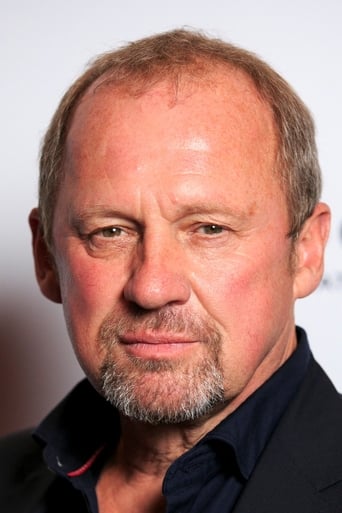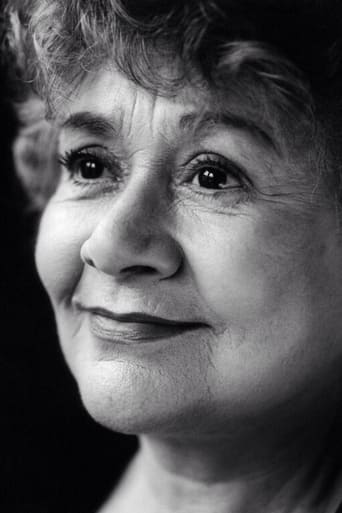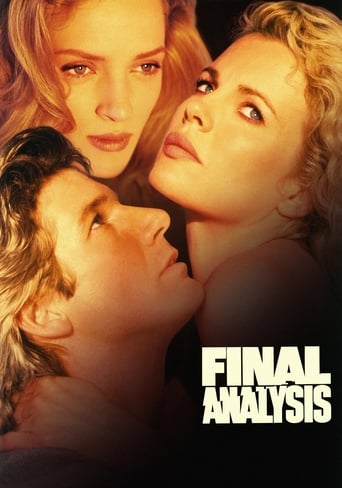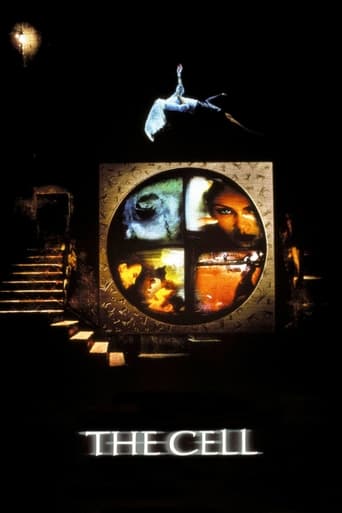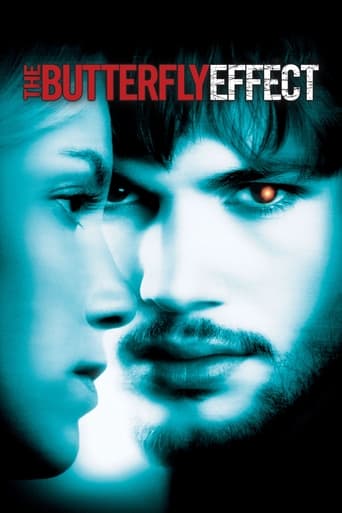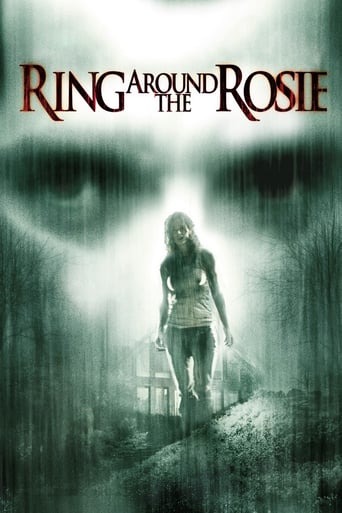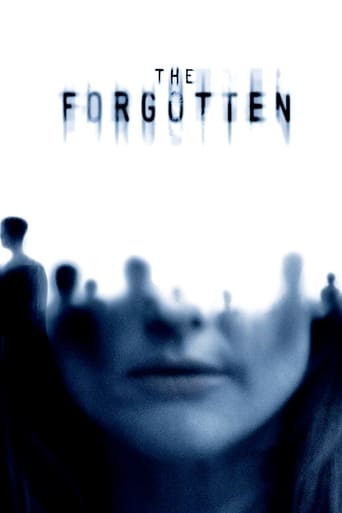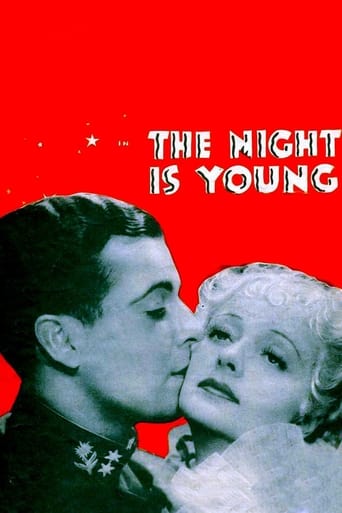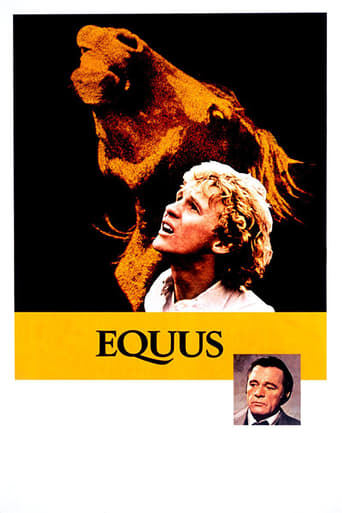

Equus (1977)
A psychiatrist, Martin Dysart, investigates the savage blinding of six horses with a metal spike in a stable in Hampshire, England. The atrocity was committed by an unassuming seventeen-year-old stable boy named Alan Strang, the only son of an opinionated but inwardly-timid father and a genteel, religious mother. As Dysart exposes the truths behind the boy's demons, he finds himself face-to-face with his own.
Watch Trailer
Cast
Similar titles
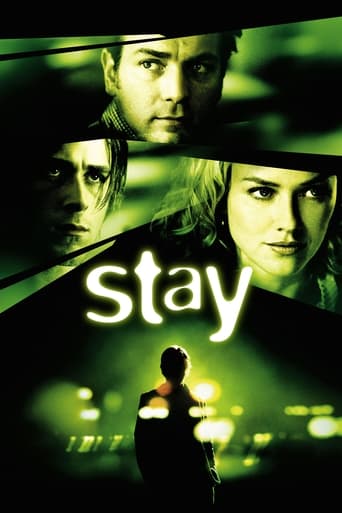
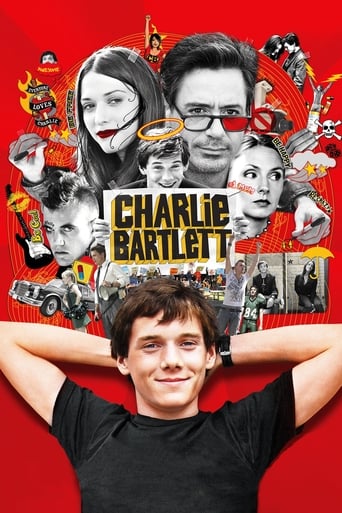
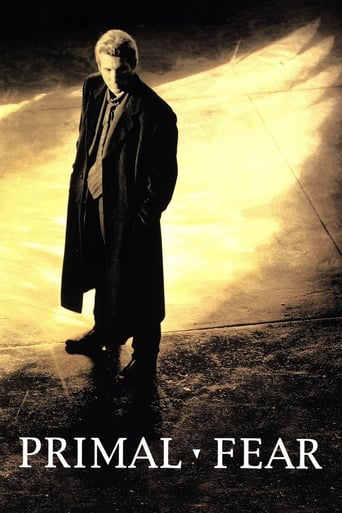
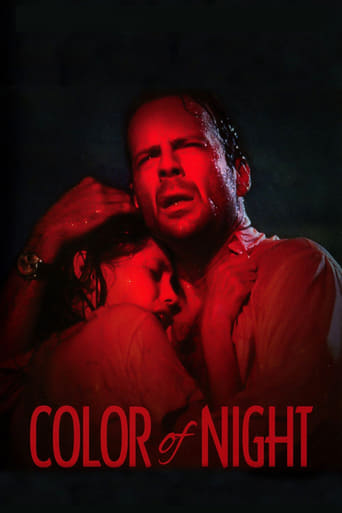
Reviews
Overrated
It's fun, it's light, [but] it has a hard time when its tries to get heavy.
Let me be very fair here, this is not the best movie in my opinion. But, this movie is fun, it has purpose and is very enjoyable to watch.
One of the worst ways to make a cult movie is to set out to make a cult movie.
Perfect, affectionate, thrilling. The wild rush of the nude in the woods, a perfect combination of soul and flesh, a passion for inner freedom.Alan, a 17-year-old who had stabbed six horses blind, was sent to a psychiatrist, Martin. During the conversation, Allen's passionate love and hatred for horses also affected Martin. He kept asking Allen and himself. Is the spiritual home of business people barren or rich? Is repression free to roam or tame? Is conflict a challenge or a surrender? Was Alan cruel or confused in stabbing the horse? The plot of the film follows the order in which Alan grew up. Alan, 6, toils his castle on the beach. He thought there was no strong adhesive in the solid building. Like his family. When his parents to entertain the doctor Martin, both husband and wife sitting position is face to face at home, and they treat you the child's position, their way of education, the way they hide their true feelings are always in opposition. My mother is used to suppressing herself, even when she is in a state of emotional breakdown. She preached to Alan the love of god, the love of asceticism in Christianity, the love of nature as indulgence, as sin, as redemption through self-punishment. And when Allen went along with his own nature, he was cursed as a depraved devil who denied him everything without knowing it. She lived in a religion she didn't quite understand. In contrast to his mother's cowardice, Allen's father was autocratic, autocratic, violent, dismissive and evasive. Parents are in a position of authority with their children, and regulations with restrictions are out of protection. They are worried about the influence of the outside world on their children, and they are also afraid of losing their superiority and control. It is pedantic and backward to keep the children in a state of ignorant and ignorant, to enlarge the evil of human nature and to erect the barrier of insulating society. Alan, who had no friends, was attracted by the live horses. Children who yearn to be free from loneliness try to touch the black horse and feel the living animal. The black knight's encouragement released Alan's freedom, freedom and even indulgence, the power to harness and control powerful forces, the ability to feel self-radiating. "Take me away," he was led to cry, and speed, passion, danger, relative desolation, boredom, and restraint were no doubt full of temptation and attraction. And his parents are afraid of his self-knowledge, strong pull away, even at the expense of him. Alan's father attributed the spinning horse to a "dangerous" population. Just as he tore up the image of Christ, he did not allow any authority to stand in for his parents. For Alan, the horse was more than a creature he loved to be close to, with its soft fur, scorching heat, and a chain of iron in his mouth that caused pain. Allen of 12 years old in his mother and the same religious story, under the influence of negative human repressed, bound with the youth germination of sexual consciousness, think that it is a sin and the supervision over their own tortured body before the horse. He dressed himself up as a horse, with a bridle on his head, and with a stick in his hand he beat himself violently, seeking relief from his pain. Through the pain of the body to eliminate the desire, imprison the spirit, in order to save and self-discipline. On the wall of Alan's room Martin, the doctor, saw wild animals and demure figures crisscrossing each other. This seems to imply the chaotic state of young people's pursuit of inner freedom and obedience to authority. The unity of knight and horse is the union of perfect ideal and spiritual freedom. The film emphasizes repeatedly that the two cannot be separated. Alan could not distinguish between the two, and even lost himself in confusion. Allen 17, parents selfish due education, raise no reading disability, in addition to television advertising, in addition to the mother forcedly stories have no history knowledge, knowledge without physics engineering biology, etc. In the first meeting with the doctor, Martin kept singing green arrow gum, martini, doctor's tea and other advertising songs. This is another aspect to show the monotony and lack of Allen's spiritual world. Martin used the words "religion", "education", and "memory" with blood. He dreamed that he become big sacrifice of blade to kill children, questions the meaning of the psychiatrist has done is subconscious, but a little bit of the germination of revolt, made him a bit out of the mainstream consciousness behavior of panic fear woke up. Martin is in communication with Alan from envy he closed lonely self to understand his mental distress, and again and torture in self survival significance, for their real life and work, but can't find the path of liberation bound. Martin's world is constantly asking about the power his career gives him, the power to control other people's emotions and force them to admit and snoop into other people's privacy. He envied Alan, and regarded Alan with detestable venom as the creator of his own pain. This is also the envy most adults have for young people. The undaunted, dynamic adults who have been bound by the rules of society or who have been playing with them and benefiting from them can no longer resist without them. Like Dalton the rancher, when you're excited to walk around the sofa, isn't it like a horse jogging around the yard? The rein is in control of the direction. He was angry and regretted his lack of alertness and attention, and his shaken confidence would forever affect his trust in others in the future. This is social classroom teaching. Alan and Martin clashed in therapy. In response to the doctor's questions, Allen went from silent to nonjudgmental (singing), denying evasion and swapping secrets one-on-one. Of course, as an adult, Martin used trickery. Seeing Allen's desire for understanding and communication, he prescribed a "placebo" -- a non-pharmacological drug prescribed in the name of therapeutic efficacy -- known as a "truth drug". Allen spoke irrepressibly of his past. Especially for the horse to wear bridle, in the night to sneak out. Before he rode, he would feed the sugar cubes, letting the faithful horse and himself carry out the ritual of devouring his SINS. It is worth mentioning that the sugar has "E" or "A" written on each side, which should be the initials of "Equus" (horse Latin) and "Alan" (Allen's name), possibly mimicking the rituals of death and rebirth. Alan railed against the commercial world in which electronics and kitchenware became junk and horses were king. Rebellious confrontation only took place in the dark night when Allen sought spiritual and sexual freedom by riding naked. Ironically, the shackled harness was the first thing to go out. No matter how naked his body is, his spiritual world has been tied down, and he can run away at ease. His ideas are the teachings of Christ stem, the even and beautiful girl and honest, can escape the intangible feelings of guilt, he stabbed the eyes of a blind horse trying to get rid of the oppression of spiritual, but ignores the horse as a divine materialized, his heart to be perfect to the world of crime and punishment is the real prison, collapse of belief. There is a lot of contrast in the film. Allen room two images contrast, Christ's crown of thorns under long hair and bridle mane, Christ's hands cuffed chain and the horse's mouth bit and bridle, AiGu look in the eyes of Christ and charming eyes moist. Alan regarded Christ as divinity, horses as the materialization of divinity, the best living love to be felt. And the horse is the universal god, who is always watching him, always supervising him, the more authoritative being in Allen's mind than his parents. Two slow motion One is Allen before riding screamed against commodity economy system, one is in the stable after the horse's eyes, eye and ruby red horse horsehead dagger appear alternately. The sharp dagger appears in the stop-motion scene at the beginning of the movie. The worship of tall faith may be the reason why the bloody story was cut apart. Alan passed the vegetable patch and the pond at night. One was a gallop under the starlight of a horse. One was walking next to the girl Jill. Squatting in the cabbage patch of a group of children, shaking a moonlit pond, the pale blue walls of a mottled horse house leave the same way as return, but with different companions. The man and horse Alan loved in his heart could not be spiritually united and became what his mother called a knight and a horse. Finally, it led to juvenile delirium. Alan praised the horse and Jill alike -- "beautiful and moving." The reaction of different people to the same action, consciousness, or object in a movie. In therapy Allen's denial can be seen as a condition of self-protection. It's like when he was attacked by his father and he said "no". Martin's denial avoidance is that he refuses to introspect and refuses to see his heart. Alan's father went into a pornographic movie theater and lied to his son. His pale excuse was just an attempt to restore the authority of the family. Alan was conscious of his father's good looks, and for the first time refused his father's face to face opposition to authority. This is the beginning of independent thinking and independent personality. The "iron chain" in the mouth of a horse is called the "horse mouth rank". It is a kind of harness to correct the direction of the horse's march, and it will also hurt the horse to some extent. For Allen to this is the doctrine of heavy moral chains, is the price of adult, copy is like artificially grown trees have been cut, to escape suffering situation will inevitably experience hurt or to harm, innocent and limpid eyes slowly accident and opacity. The pain of the chain is the price of salvation. Martin kept asking "why me?" In his treatment of Allen, he pondered the erosion of the commercial soci
Peter Shaffer's screenplay ought to have made a fascinating and puzzling story although, to be sure, this isn't director Sidney Lumet's usual territory. Lumet handles torment deftly enough but the torment is found in New York City.Here, the setting is England, and Lumet does his best, as do the performers, but it seems to me that they're all hobbled by a screenplay that mixes all kinds of confused metaphysics with some extraordinary psychopathology.Peter Firth plays a rather ordinary English lad who has been fascinated by horses since childhood. Okay, lots of girls find horses sexy, but Firth's equipoise is such that he's obsessed with them and loses touch with the humdrum world of his family and friends. He worships these dumb brutes.He's confined to a funny farm after a savage attack on half a dozen horses at the stable he works in -- a scene based on a real incident. Under the care of Richard Burton, a psychiatrist, he reveals, little by little, the developments that led up to this heinous act.Briefly, he's come to think of horses as some kind of Godhead. He fantasizes about stripping naked and riding them through the night, sharing food with them, caressing them, freeing them from their chains even through self sacrifice.Then he's confronted by a posh girl at the stables named Jill. She's played by Jenny Agutter. Agutter's tastes run more to the physical than the theological. She's attracted to him and tries to seduce him in the loft of the stable, while the horses below snuffle and stomp. Now, Jenny Agutter is a very attractive young lady with the face of an Alien from outer space and a figure at once sinewy and voluptuous. Firth is a guy who can get off by thinking about riding horses bareback and in the nude, but he can't manage to be turgid while making love to Agutter. Right away, we're convinced this kid is really sick.All the while he's writhing on top of her, he's thinking about the horses. He believes they're staring at him. You know, "Our God is a jealous God"? So he throws out the naked Agutter and puts out the eyes of the horses.And what is Doctor Burton's response to all this? He's JEALOUS of the kid's passion! His own life is that of an urban bourgeois. He's been married to the same sensible woman for years and theirs has become what family therapists call a companionate marriage. Her job is to run the comfortable house. His job is to make the salad while she prepares dinner. He feels his life lacks ardor because he doesn't suffer from transcendental zoophilia.There are a few striking moments in the film: (1) when Firth goes for his first pony ride at the beach; (2) a nicely photographed scene when Firth gallops a horse through the fields and evidently ejaculates; (3) the fully nude episode with Jenny Agutter in the loft; and (4) the monstrous attack on the innocent horses.The rest is talk. Fully blown talk, elegant in grammar and imagery, not at all like the garden-variety speech that people use in everyday life. For my taste, admittedly warped, there are too many scenes of Richard Burton looming over his recalcitrant patient and shouting, "TELL me!" Burton does the best he can. His voice is incomparable but the character is so sullen that his presence brings little joy to the screen. Firth has the juiciest part.The model of psychosis we see in this movie is supposed to be based on an historical incident but, man, does it romanticize madness. Firth's character doesn't do any of the things that ordinary psychotics do. His gibberish is the gibberish of James Joyce in "Finnegans Wake." The only REALLY odd thing he does, aside from spurning Agutter, is to blind those horses. He doesn't go about in tattered clothing. He doesn't speak to himself. He doesn't masturbate in public. He's lively and clever, rather than flat and empty.I wonder, too, if some of the story is at least in part a joke from the author. Peter Shaffer, the playwright, has a twin brother Anthony who also writes plays ("Sleuth"). And Firth's mother has a line in which she attributes Firth's initial fascination with horses to the fact that their genus is "Equus" and the kid had never seen a word with "two yous" before. Well, with "Equus" on one side and "Sleuth" on the other, the equupoise is nearly perfect.
Equus is based on a play by Peter Shaffer and focuses on a psychological investigation into a heinous crime committed by a young boy at a stable in Hampshire. The film handles themes that wont go down well with many audiences; there are clear bestiality scenes (made more shocking by the human participant's young age) and some very shocking violence directed towards animals; yet in spite of this, the film still managed to get nominated for a few Oscars, and that is testament to the great work put into it by the two central actors who do a brilliant job of bringing Peter Shaffer's story to life. The film begins with a description of the boy's crimes; in a fit of rage he blinded a group of horses inside a stable. Psychiatrist Martin Dysart hears the story and decides to take on the case. Through talking to the boy as well as his family and other people that knew him, the psychiatrist begins to build up a picture both of the boy's character and development, as well as the events leading up to the atrocious crimes that he went on to commit.The interaction between the two central characters is the main focus of the film and this is also its central element. The film really needs two great actors to carry this off and it gets them in the form of Richard Burton and Peter Firth. Both of them fit into their characters very well and convince throughout; Firth especially as he has to act out some rather uncomfortable scenes. At 138 minutes, Equus seems like it might turn out to be a little bit too long, but it actually makes very good use of it's time, which flies by and the film doesn't become boring at all despite it's slow pace. I have not read the literature that this film is based on, but unfortunately I got the impression that some things were left out of this one as it feels like the film has some defining point to make; but one is never really made. The film also has holes regarding the reasoning behind the boy's strange development; the religious and sexual themes come through but certain things are left unexplained. It all boils down to a shocking conclusion that will shock and offend many viewers. However, despite some problems; Equus is still an excellent film and one well worth spending time on.
Stable boy Alan Strang (Peter Firth) has blinded a number of horses and no one can figure out why. Psychiatrist Martin Dysart (Richard Burton) tries to find out why.I've never seen the stage play so I can't compare it to that but, on its own, this is a pretty dull movie. For starters the main character Alan was an incredibly unlikable jerk. I couldn't have cared less about what happened to him. I thought it was laughably obvious--I had figured out what was going on long before they actually tell us. The pacing in this one is leaden--every scene seems to be dragged out as much as possible. Also the symbolism and "meaning" of this film is about as subtle as a sledgehammer. I actually started to get insulted that everything was being spelled out for us--and in an incredibly slow manner too. It seems the filmmakers thought the audience was composed of a bunch of idiots. It also has a sequence of truly horrifying violence at the end that really didn't need to have been shown. Also there's plenty of nudity in this mostly by Peter Firth.The only thing saving this from being a total disaster was the acting. Joan Plowright is good as Strang's mother and Firth was also good in a very difficult role. But this is Burton's film all the way. He's just superb in his role and manages to single-handedly save this from totally unwatchable. Still, his great acting can't save this film from being a total bore. A 4--and that's just for Burton. This was a critical bomb when it came out--it's easy to see why.
